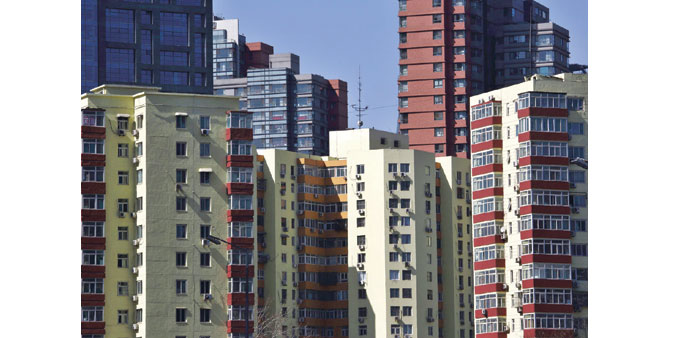Reuters
Hong Kong
China’s average new home prices continued to fall in March, but on a narrowing trend that is expected to continue as the government’s stimulus policies bolster sales volumes.
Average new home prices in China’s 70 major cities dropped 6.1% last month from a year ago, the seventh consecutive month fall, following February’s 5.7% decline.
But the monthly fall between March and February was 0.1%, narrowing from a 0.4% fall in the previous month, with the capital city of Beijing braking eight consecutive drops and rising 0.3%, as prices continue to stabilise.
China’s gross domestic product grew at its slowest pace in six years at the start of 2015, building expectations that authorities will roll out more policy stimulus to avert a sharper slowdown.
Growth in China’s real estate investment in the first quarter slowed to 8.5% from a year earlier, the lowest rate since 2009 as developers focused on clearing excess inventory, but property sales volume’s decline narrowed, down 9.2%.
Price recovery will be slow, however, weighed by inventory still at its high level especially in the lower-tier cities, as many developers are resorting to price cuts to reach sales targets.
“The slowing decline in home prices was in line with expectations and it didn’t show big improvement. After the stimulus policies in late March, we have to have at least three more months of solid data to confirm a bottoming of the housing downturn,” said Roselea Yao, an economist at Gavekal Dragonomics based in Beijing.
“If we don’t see much better data, the government will have to roll out more loosening policies such as raising the household leverage.”
The National Bureau of Statistics (NBS) data yesterday showed new home prices in Beijing rose 0.3% between March and February, bouncing from a 0.2% fall in February from January, while Shanghai prices were flat following a 0.1% fall. Another top-tier city, Shenzhen, rose 0.7% after 0.2% last month.
Liu Jianwei, a senior statistician at NBS, said in a statement that he expected home sales and prices to continue to stabilise.
China has implemented a series of loosening policies since the third quarter in 2014, relaxing home purchase restrictions, cutting interest rates, and easing bank reserve requirements to bolster the housing market, which accounts for some 15% of GDP. The latest policy measures include lowering second-home mortgage terms and increasing home-buying tax breaks.

Residential buildings in Beijing. Average new home prices in China’s 70 major cities dropped 6.1% last month from a year ago.
